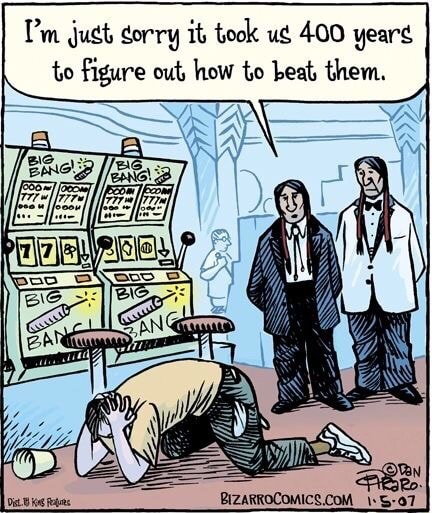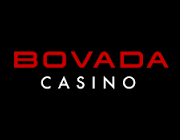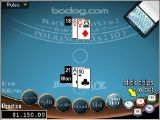Average Loss
(aka, Expected Loss; and Expected Value)
Last update: January 2022
Expected Loss is somewhat of a misnomer. It's not the amount you actually expect to lose. It's the mathematical average loss. Mathematicians call it expected loss, but to help you understand it better, I'll call it average loss.
Let's start off with something really useful, my Average Loss Calculator, which you won't find anywhere else. It compares the average loss for various games with various assumptions.
| Average Loss Calculator | |||||
| Game | Rounds / Rolls Per Hour |
Bet per round | House Edge |
Average
Avg.
Loss for hour(s) hrs of play |
|
| Slots | $ | ||||
| Roulette | $ | ||||
| Video Poker | $ | ||||
| Baccarat | $ | ||||
| Craps |
ROLLS per hour
|
$ | |||
| Blackjack | $ | ||||
| These are mathematical averages. You could lose more or less. Craps edge is per roll. | |||||
| Play online casino games with fake money! It's better than losing real money. | |||||

Licensed from Dan Piraro of Bizarro.
Here's the take-away from the calculator:
- Slots suck. Slot machines suck your money away faster than any other casino game. Unless you're comfortable with the kinds of losses shown, then either switch to video poker or table games (see my crash course in table games), or if you must play slots, then at least bet less per spin.
- Speed kills. The faster you play, the faster you lose. So slow it down. Play leisurely. For table games, look for full tables, which will automatically slow things down.
- Bet high and die. The more you bet, the more you'll lose. On a "penny" slot, if you're playing 40 lines times 5 credits per line, that's $2 a spin. Cut your losses by betting fewer lines or credits. My wife and I play just a penny at a time. We can afford to lose a lot more, but we have just as much fun with the pennies.
- Don't get cut on the edge. The house edge is the casino's average profit per bet, and it varies from game to game. The higher the edge, the more you lose. You can't know the edge of the slot you're playing because the casinos don't disclose it, but we've got a good idea of slots in general because of the reports the casinos file and because of independent research. In some games, like video poker and blackjack, the house edge goes up if you don't play proper strategy.
- More play = more losses.
The longer you play, the more you'll lose. So take a break
from gambling and have some other kinds of fun on your vacation.
How to calculate average loss
You don't have to calculate average loss, because my calculator above does all the heavy lifting for you. But if you want to, here's the formula:
Rounds per hour x Amount Bet x House Edge x Number of Hours = Average Loss
As a practical example we'll use a slot machine with typical assumptions:
700 spins x $2.25 x 6% x 2 hrs. = $189
Why the expected loss is not the amount you expect to
lose
"Expected loss" is the mathematical average loss. It's not the amount you actually expect to lose. Let's see why.
The house edge in roulette is 5.26%. So your "expected loss" on a $5 roulette bet is $5 x 5.26% = $0.26.
But if you bet $5 on roulette you can't lose exactly $0.26. If you bet on red or black, you'll either win $5 or lose $5. So you don't really expect to lose $0.26, because that's impossible. The $0.26 is the mathematical average loss on each $5 bet. That is, if you made a gazillion $5 bets, your average loss would be around $0.26 for each bet.
So, I'm on a mission to replace the poorly-named "Expected Loss" with the more meaningful "Average Loss". I hope you'll join me.
Your loss becomes more “average” the longer you play
Average Loss is just that: the long-term average. If the average loss on an hour of slot play is $63, you don't expect to lose exactly $63 every time you play. If the game were that predictable it would be boring, and unattractive. You have to have a chance of winning or you wouldn't play, and in the short term, you can indeed win.
But the longer you play, the more likely you are to lose. As you keep playing, your losses will tend to approach the Average Loss. Here's another calculator, this time which simulates a bunch of bets on red in roulette. It shows that anything can happen in the short term, but in the long term, losses are practically guaranteed.
Expected Value
The flip side of expected loss is expected value. Expected loss is the average loss from a bet, and expected value is the average amount you retain at the end of a bet. For example, if you bet $100 and your expected loss is $5, your expected value is $95.
Bets on casino games are called negative-expectation bets because you wind up with less than you bet. As in our previous example, each $100 bet on roulette returns $95 on average, for a loss of $5. This is why betting systems can't be winners: no combination of negative numbers can ever be positive. A bunch of negative-expectation bets will always be negative-expectation bets, no matter how you slice them up.
Expected value is of limited value for the lottery
As they say, a little knowledge is a dangerous thing. Some people learn about the house edge and expected value, and then try to apply those concepts to non-casino games like the lottery, and come to ridiculous conclusions, such as that lotto is a horrible bet compared to blackjack, or that it's better to play when the jackpot reaches a certain level because then the expected value will be positive. Here's an article on why those ideas are fatally flawed.
| House Edge Simulator | |||
| Bet $5 on red... | or Lost |
||
| 1 time | |||
| 10 times | |||
| 100 times | |||
| 1000 times | |||
| 100,000 times | |||
| 1,000,000 times | |||
|
|
|||


